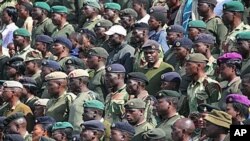Zimbabwe needs a professional army that serves the people and not politicians, says the U.S. ambassador to Zimbabwe, Charles Ray. Ray's remarks, at an event at the U.S. embassy Tuesday, come at a time when many Zimbabweans are calling for reform of the country's security sector ahead of the next elections.
Zimbabwe's Movement for Democratic Change party [MDC] accuses the 30,000 strong Zimbabwe National Army of unprofessional behavior. Specifically, the party says the army and other security services are loyal to President Robert Mugabe's ZANU-PF party rather than to the people of Zimbabwe.
Most top members of the army were involved in the war against white minority rule during the civil war of the 1970s. President Mugabe says no one but those who played a role in that liberation struggle should lead Zimbabwe. Also, several top security officers in the army, police and prisons service have said they would never take orders from politicians who had not fought in that war.
MDC leader Morgan Tsvangirai, who is prime minister in the tense, inclusive MDC - ZANU-PF government, did not take part in the liberation war, although he says he supported an end to white rule.
U.S. Ambassador Ray is a military veteran who served the U.S. armed forces in the Vietnam War. He referred to a professional military service when answering questions at the veterans’ event Tuesday.
“A professional military serves the entire country. Military people as individuals are entitled to their personal political views. Those personal political views, though, should never be allowed to impact on the performance of their duty as a military that belongs to the country,” said Ray.
The British army trained Zimbabwe’s new army for 20 years from the date of independence from white minority rule in 1980. The army was made up of former guerrilla fighters and some members of the old Rhodesian forces. The Zimbabwe National Army assisted Mozambique in the 1980’s when it was under fire from South African-backed rebels. It also went to war in the Democratic Republic of Congo and ensured the survival of the Kabila administration.
But more recently, in the violence during the 2008 presidential run-off election, many MDC supporters say members of the army beat them and killed their relatives.
Ray warned that an unprofessional army is dangerous.
“The role of military is to defend territorial integrity of the country. When the military becomes associated with a segment of a country then it is no longer professional military, it is an armed gang,” said Ray.
The MDC says that without reform of the security sector, free and fair elections in Zimbabwe will not be possible.
US Ambassador Says Zimbabwe's Army Must Serve People
